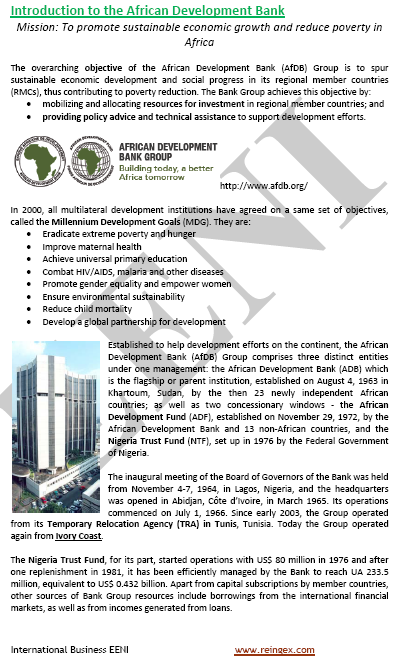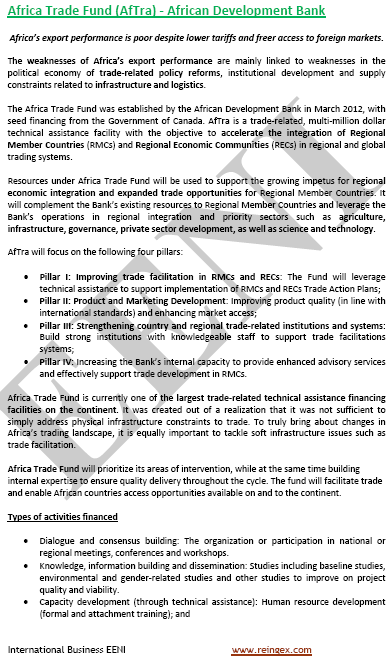African Development Bank. Nigeria Trust Fund
Economic Integration in Africa. African Development Fund
The African Development Bank is a multilateral development bank whose shareholders include fifty-three African Countries (regional member countries) and twenty-four non-African Countries (America, Asia, and Europe).
Most of the Member Countries of the African Development Bank are small, undiversified and face physical, political, and policy-induced constraints to the deeper economic integration with their neighbor countries and Global Economy.
However, economic cooperation and regional integration are fundamental if Africa surpasses trade barriers and take its rightful place in the global market.

- Introduction to the African Development Bank (AfDB)
- African Development Report
- Structure of the African Development Bank
- Strategy of the African Development Bank
- Infrastructure development (PIDA)
- Regional economic integration
- Intra-African trade
- Private sector development
- Governance and accountability
- Skills and Technology
- Funds of the African Development Bank:
- African Development Fund
- Nigeria Trust Fund
- Africa Trade Fund
- Africa 50 Infrastructure Fund
- African Financial Markets Initiative (AFMI)
- African Financing Partnership
- African Guarantee Fund for Small and Medium-sized companies
- Financial instruments of the African Development Bank
- African Peer Review Mechanism AUDA-NEPAD
- African Women in Business Initiative
- Agriculture and agro-industries
- Agriculture Fast Track (AFT) Fund
- Case Study: Impact of global crisis in Africa
Projects and Operations of the African Development Bank
- Introduction to the projects and operations of the African Development Bank
- Doing Business with the African Development Bank.
- Project Cycle
- Project identification
- Project preparation
- Project appraisal
- Loan negotiation
- Board approval
- Loan signing
- Loan effectiveness
- Implementation
- Post evaluation
- Procurement
Sample - African Development Bank Group:


The purposes of the subject “The African Development Bank” are:
- To understand the objectives, structure, and functions of the African Development Bank
- To identify the cooperation areas of the African Development Bank
- To analyze the strategy of the African Development Bank
- To evaluate the funds (African Development Fund, Nigeria Trust Fund, Goodwill of Africa) and financial instruments of the African Development Bank
- To understand the functioning of projects and operations of the African Development Bank

The Subject “African Development Bank” is included within the curriculum of the following academic programs at EENI Global Business School:
Master in Business in Africa, International Business.

Doctorate in African Business.

Languages:  or
or  Banque Africaine Developpement
Banque Africaine Developpement  Banco Africano Desenvolvimento
Banco Africano Desenvolvimento  Banco Africano Desarrollo.
Banco Africano Desarrollo.
- Subject Credits “African Development Bank”: 2


The African Development Fund is managed by the African Development Bank and includes the Member States (donor countries) and recipient economies.
- Main objective of the African Development Fund is to achieve poverty reduction in Africa by providing loans and grants
The Nigeria Trust Fund is a special African Development Bank fund created in 1976 by an agreement between the Bank Group and the Government of Nigeria.
- The objective of the Nigeria Trust Fund is to assist development efforts of low-income regional African Countries whose economic and social circumstances and forecasts require concessional financing
In 2014, the African Development Bank returned to Abidjan.
The African Development Bank belongs to African Civilization.
African Regional Economic Communities (REC).
- Community of Sahel-Saharan States (CEN-SAD)
- Common Market for Eastern and Southern Africa (COMESA)
- East African Community (EAC)
- Economic Community of Central African States (ECCAS)
- Central African Economic and Monetary Community (CEMAC)
- Economic Community of West African States (ECOWAS)
- West African Economic and Monetary Union (WAEMU)
- West African Monetary Zone (WAMZ)
- Intergovernmental Authority on Development (IGAD)
- Southern African Development Community (SADC)
- Southern African Customs Union (SACU)
- Arab Maghreb Union
Regional Integration in Africa.
In the last forty years, the African Development Bank has promoted the Regional Economic Communities (REC) through regional economic cooperation, International Trade growth, capacity building and renewed assistance for AUDA-NEPAD programs.
The African Development Bank also collaborates with the national governments and the pan-African Organizations; it is of particular importance with the African Union and the UNECA to rationalize and streamline the Regional Economic Communities structures.
Regional member countries of the African Development Bank: Algeria, Angola, Benin, Botswana, Burkina Faso, Burundi, Cameroon, Cape Verde, Central African Republic, Chad, Comoros, Congo, Ivory Coast, Democratic Republic of the Congo, Djibouti, Egypt, Equatorial Guinea, Eritrea, Eswatini, Ethiopia, Gabon, Gambia, Ghana, Guinea, Guinea-Bissau, Kenya, Lesotho, Liberia, Libya, Madagascar, Malawi, Mali, Mauritania, Mauritius, Morocco, Mozambique, Namibia, Niger, Nigeria, Rwanda, São Tomé, Senegal, Seychelles, Sierra Leone, Somalia, South Africa, Sudan, Tanzania, Togo, Tunisia, Uganda, Zambia, Zimbabwe.
Non-African Member Countries: Argentina, Austria, Belgium, Brazil, Canada, Denmark, Finland, France, Germany, India, Ireland, Italy, Japan, Kuwait, Luxembourg, Netherlands, Norway, Portugal, Saudi Arabia, South Korea, Spain, Sweden, Switzerland, Turkey, UK.
Related topics:
African population African Value Chains.

(c) EENI Global Business School (1995-2025)
Top of this page








 WhatsApp
WhatsApp